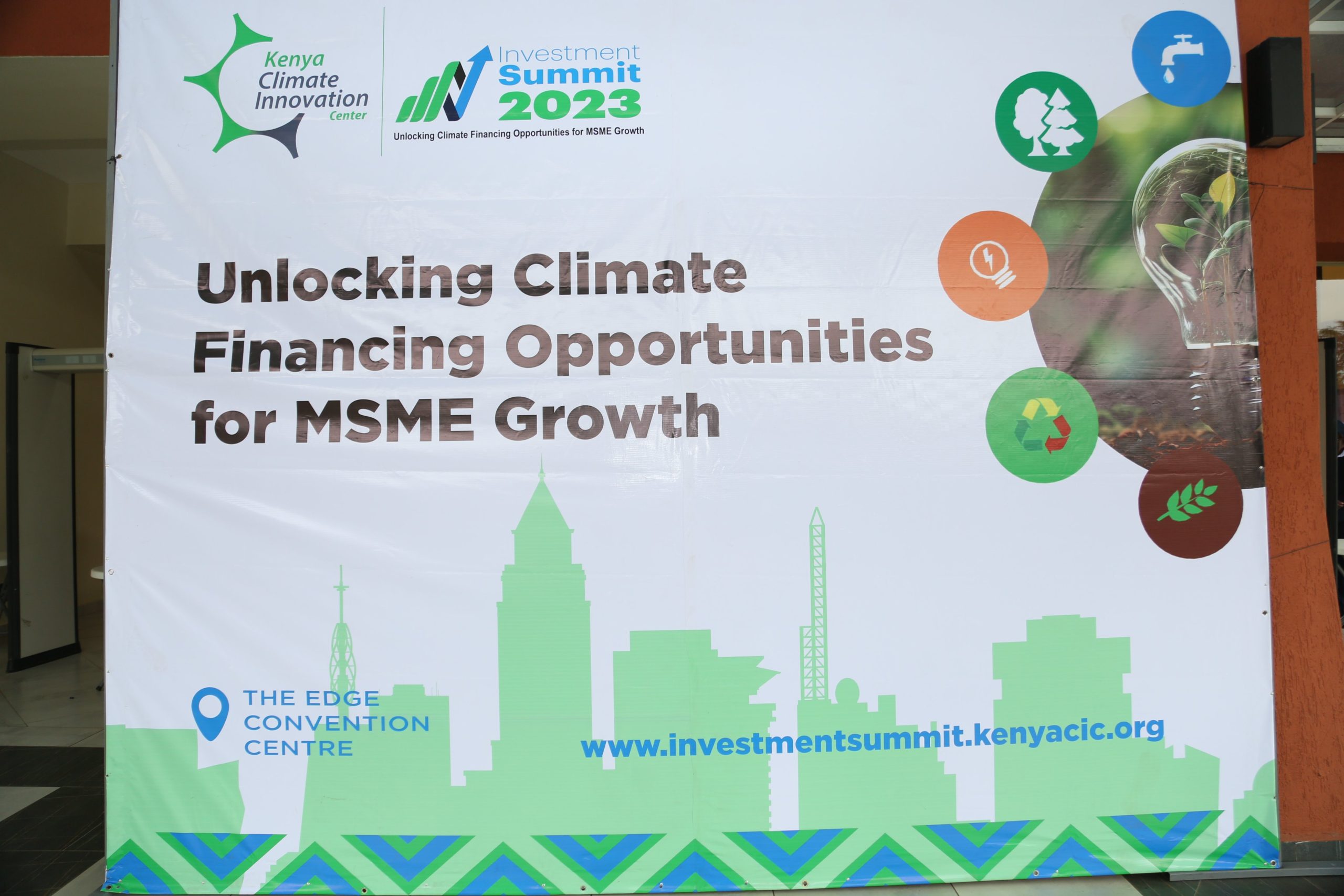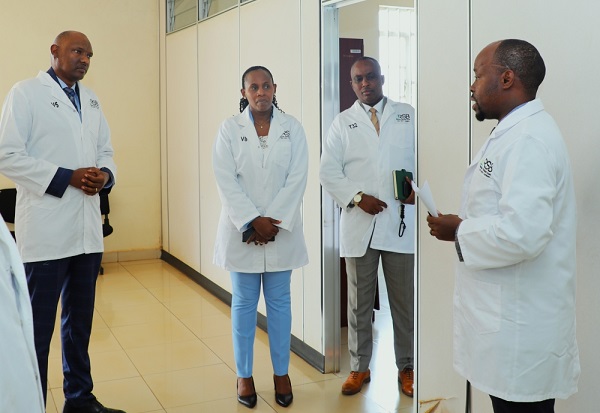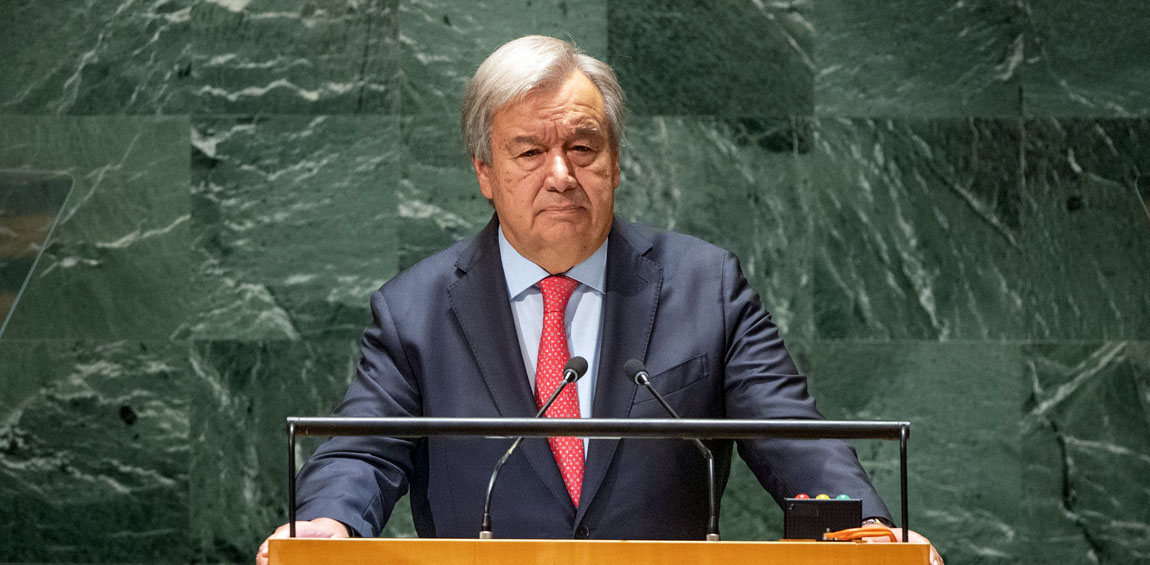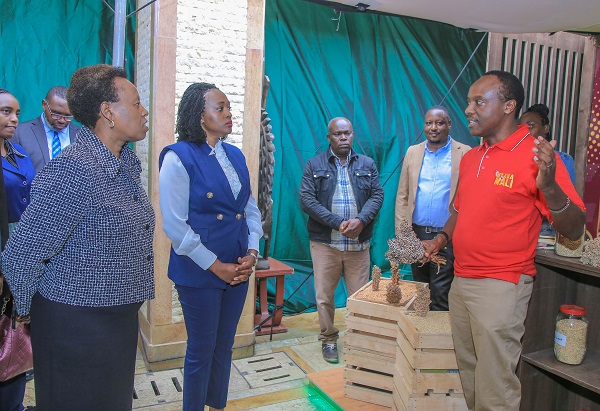Climate Change
● Roam in collaboration with pilot partners includes big players in the transport sector such as Riara Schools, KBS Sacco, Virginia Coach, ZamZam Sacco, and Good Testimony Schools launched the Roam Move Bus shuttle.
● The start of the electric shuttle bus operation promises a quieter, cleaner, and more economical way to get around the city, especially with rising fuel prices and the urgent need to reduce the carbon footprint generated by the transport sector.
Roam has announced the official start of the Roam Move electric shuttle bus operation. The Roam Move is the
second bus type by the company (the first being the Roam Rapid, their electric mass transit bus.) Since this is a locally assembled electric shuttle bus, this pilot program marks a significant milestone in Roam’s commitment to providing clean and efficient urban mobility solutions.
Roam Move is not just a product; it’s a commitment to a cleaner future. By picking the Roam Move, partners such as Riara Schools, KBS Sacco, Virginia Coach, ZamZam Sacco, and Good Testimony Schools, all choose to be part of a sustainable urban transportation solution that benefits the environment and our community.
The Roam Move runs solely on electricity to eliminate emissions and make a substantial impact on reducing the urban transportation carbon footprint. Inside, passengers can enjoy their journeys with spacious, comfortable seating and air conditioning. Moreover, the Roam Move’s electric motor guarantees a noise-pollution-free and zero-emissions
experience, benefiting passengers and the communities it serves.

Notably, it has a carrying capacity of 51 passengers and a range of 200km. The Roam Move offers a range of benefits, with one standout feature being its low maintenance requirements in comparison to its diesel-run counterparts. This not only keeps operational costs significantly lower, reducing expenses by up to 50% but also guarantees that bus operators can maximize efficiency and minimize maintenance overheads.
These substantial cost savings for operators translate into affordable and budget-friendly rides for everyday commuters, ensuring that sustainable travel is accessible to all.
“We are thrilled to officially launch the Roam Move bus operation and introduce an innovative, sustainable transportation solution to the city of Nairobi,” said Dennis Wakaba, Country Sales Executive at Roam. “Our mission is to enhance urban mobility while minimizing environmental impact, and the Roam Move is a prime example of that commitment. We believe this will revolutionize the way people travel within the city, making it more convenient and eco-friendly.”
Fostering Climate Resilience and Sustainability for Small Businesses
The 11th Annual SME Conference and Expo opened on a promising note, focusing on critical measures that Small and Medium Enterprises (SMEs) can adopt to promote sustainability while diving deep into discussions on enhancing resilience.
These discussions aim to equip SMEs with the tools to fortify themselves against climate crises, which, though often unpredictable, have the potential to inflict severe damage on businesses, especially those within the SME sector.
Held at Strathmore University Business School under the theme ‘Sustainability and Climate Resilience: Creating Opportunities for SMEs,’ the event provides a platform for SMEs to actualize their responses to the climate crisis.
The conference brings together speakers from diverse backgrounds and platforms, with a concentrated focus on elucidating solutions that SMEs can embrace to not only prosper in their respective sectors but also transform the overarching narrative.
It is crucial to recognize that climate change poses a significant threat to businesses across various sectors and geographical regions, transcending the boundaries of selectivity. Businesses, which once primarily prioritized growth and consumer satisfaction, are now pivoting towards the “3 Ps” – People, Profit, and Planet – in their operational ethos.
As President Ruto William aptly stated, addressing the climate crisis necessitates a collective approach that transcends global divisions, unifying stakeholders worldwide.
The urgency of embracing sustainability is underscored, as it presents a pathway to a brighter future. Businesses are urged to harness resources without compromising the ability of future generations to access these essential resources.
Mary Wanjeri Mbugua, Regional Trade Facilitation Office of Economic Growth and Integration, commends the efforts undertaken by climate-conscious SMEs, emphasizing their commendable commitment to environmental preservation.
This commitment extends from sourcing practices to energy-efficient production methods and efficient waste management.
As a part of the Africa Trade and Investment Program, Mary highlights the vital role of SMEs, which globally account for 90% of jobs, often providing employment to one or two individuals.
“These small businesses play a crucial role in completing the broader business value chain,”
She further emphasizes the need for businesses to shift their perception and invest in workshops, forums, and training programs to enhance their knowledge base.
Several of these forward-thinking SMEs, as Mary notes, have received support congruent with their environmental initiatives. One noteworthy example is an enterprise that transforms market waste into organic fertilizers, contributing to waste reduction and environmental sustainability.
Mary advocates for increased collaboration among SMEs, promoting shared learning, growth, and enhanced resilience.
Sustainability cannot be overemphasized; it is a clarion call for all businesses to balance production with safeguarding resources for future generations. By doing so, businesses empower themselves to better withstand the unprecedented challenges posed by climate crises as they seek to grow and thrive.
It is evident that SMEs are striving to maintain equilibrium despite the adversities posed by the climate crisis, compelling them to innovate or risk obsolescence. Innovation, in this context, refers to a shift toward solution-oriented strategies to address the challenges at hand and ensure the long-term viability of businesses.
Mr. Robert Kibara, CEO of HFC Group, dispels the notion that sustainability is inherently expensive. Instead, he portrays it as a strategic investment opportunity, motivating both large and small firms to venture into this space.
He cites the installation of solar panels on their office rooftops as a successful solution, reducing their reliance on expensive traditional power sources.
Mr. Kibara further underscores the importance of a thriving sustainability sector with numerous participants. This, he argues, allows for strategic collaborations that can accelerate action toward sustainability and the development of climate resilience.
United Nations (UN) Secretary General’s Advisory Group on Local and Regional Governments
The United Nations (UN)Secretary-General, Mr. António Guterres, launched his Advisory Group on Local and Regional Governments, through its first hybrid meeting among its 20 members.
The meeting offered an opportunity to exchange strategic topics pertaining to local and regional governments’ engagement and action in relation to recovery measures from multiple and overlapping crises and advancing international agreements and standards, including sustainable development, gender equality, social inclusion, climate action, the new urban agenda, and human rights.
“As we consider ways to make multilateral institutions more effective, and to meet the current and future challenges facing people and planet, we need the perspectives and engagement of local and regional authorities”, stated the Secretary-General during the opening of the meeting.
The Advisory Group will work over a one-year period and meet with the Secretary-General on three occasions to inform on local and regional governments’ dimensions for consideration in preparatory processes of the Summit of the Future.
The Group’s work will also address modalities and means to enhance institutional mechanisms to strengthen engagement of local and regional governments in intergovernmental processes; opportunities to strengthen cooperation between national and local and regional governments, and the UN Country Teams; and recommendations on a United Nations global strategy for the engagement of local and regional governments, including institutional mechanisms, intergovernmental processes, and partnership arrangements, to strengthen contributions to the implementation of the 2030 Agenda for Sustainable Development and the New Urban Agenda.
The Advisory Group will therefore serve as a mechanism to engage contributions from sub-national stakeholders and enhance coordination and collaboration between cities, regions, nations, and international processes, to support course corrections and identify resources for the delivery of the SDGs with impact, scale, and speed. The Group is expected to produce a set of recommendations with strategic guidance in the run-up to the Summit of the Future in September 2024.
The Advisory Group encompasses 15 representatives of local and regional governments, nominated by the Global Taskforce, and leaders from five countries, Colombia, India, Nigeria, the Philippines, and Spain, with responsibilities or recognized expertise on multi-level governance. The United Nations Human Settlements Programme (UN-Habitat) will provide Secretariat support to the Group.
Ms. Pilar Cancela Rodríguez, State Secretary for International Cooperation in Spain, and Ms. Fatimetou Mint Abdel Malick, President of Nouakchott Region in Mauritania, were appointed co-chairs of the Group.
At the meeting, Ms. Cancela Rodríguez noted, “Development entails people, and needs to protect those who are most vulnerable, based on a reformed social contract, which is built from the bottom up.”
Ms. Fatimetou Mint Abdel Malick, also emphasized, “Our organized constituency stands ready to take action together with the United Nations for the future of multilateralism, from the diversity of our cities and regions and reaffirming the transformative power of feminist leadership and multilevel governance. “
Finally, as host city, Mr. Eric Adams, Mayor of New York, USA, stressed how, “the Canada fires which impacted NYC, from thousand miles away, are a constant reminder, on the need for endless collaboration and pursuit for climate action. To be at the height of our expectations for the 2030 Agenda on Sustainable Development extra powers and resources for cities and regions are needed.”
Other Mayors and Governors also reiterated their commitment and ambition to the SDGs, including on climate and biodiversity action, noting “Mayors are climate doers, not climate delayers. Local action is key to ensuring the implementation of the 2030 Agenda for Sustainable Development. Almost 65 percent of SDG targets cannot be met without involving local and regional governments.”
The Advisory Group will also consult with platforms that advance local governments engagement, including those led by local or regional governments, Member States, or UN entities, such as the World Assembly on Local and Regional Governments, Advisory Committee for Sustainable Urbanization, United Nations Advisory Committee on Local Authorities (UNACLA), the Local 2030 Coalition of the Decade of Action, and the Local and Regional Governments Forum.
Composition of the Advisory Group:
| Members of the Secretary General’s Advisory Group on Local and Regional Governments |
| Ms. Catalina Velasco, Minister of Housing, City and Territory, Colombia |
| Ms. Nandita Chatterjee (IAS), retired and has served as the Secretary, the Ministry of Housing and Urban Affairs (MoHUA), India |
| H.M. Eng. Suleiman H. Adamu, Federal Ministry of Water Resources/ Traditional Title Holder, Nigeria |
| Ms. Pilar Cancela Rodríguez, State Secretary for International Cooperation, Spain |
| Ms. Marivel Sacendoncillo, former Undersecretary (Deputy Minister), Department of the Interior and Local Government (DILG), Philippines |
| Ms. Carolina Cosse, Mayor of Montevideo, Uruguay
Ms. Paola Pabón, Governor of Pichincha, Ecuador Mr. Bernard Wagner, Mayor of Belize City, Belize |
| Ms. Abby Binay, Mayor of Makati City, Philippines
Mr. Atiqul Islam, Mayor of Dhaka North City Corporation, Bangladesh |
| Dr. Yousef Shawarbeh, Mayor of Amman, Jordan
Ms. Fatma Şahin, Mayor of Gaziantep, Türkiye |
| Ms. Fatimetou Mint Abdel Malick, President of Nouakchott Region, Mauritania
Ms. Asmaa Rhlalou, Mayor of Rabat, Morocco Mr. Peter Anyang’ Nyong’o, Governor of Kisumu County, Kenya |
| Ms. Sharon Dijksma, Mayor of Utrecht, Netherlands
Ms. Anne Hidalgo, Mayor of Paris, France Mr. Sadiq Khan, Mayor of London, United Kingdom |
| Mr. Eric Adams, Mayor of New York, USA
Ms. Valérie Plante, Mayor of Montreal, Canada |
The Kenya Climate Innovation Center (KCIC), in collaboration with various partners on Wednesday running till Friday, organized an Investment Summit titled ‘Climate Financing Opportunities for MSMEs Growth.’
The summit aims to bring together donors, sponsors, entrepreneurs, and enterprises in one setting to facilitate easier access to funding.
This initiative is a significant step towards supporting medium and small enterprises in addressing the challenges posed by climate crisis events, many of which are unforeseen.
Mr. Murabula Joseph, CEO of KCIC, emphasized that the summit follows the Africa Climate Summit and breathes new life into the journey towards impactful climate actions through funding.
Mr. Murabula Joseph highlighted that MSMEs form the largest employment sector in the Kenyan business landscape, offering substantial opportunities to the energetic, innovative, and dynamic young population.
He also revealed that KCIC has been supporting entrepreneurs focused on green growth, from incubation to business scaling.
“Over the past eleven years, KCIC has contributed to the creation of more than 4000 jobs since 2011, with an annual addition of over 400 jobs,”.
Climate change is a global challenge, exacerbated by unprecedented floods, rising food insecurity, and unprepared-for droughts, leaving millions affected. This underscores the urgent need for unified collaborative action to lead climate actions towards sustainable development.
Mr. Murabula further stated that the summit is their canvas, and they want to create a masterpiece together with everyone present.

“Let’s develop well-curated climate response actions that are targeted and informed for optimized impact.”
The transition to a green economy is becoming a reality, offering substantial potential despite the challenges. For instance, Kenya has a 213 billion market opportunity in the green economy sector.
According to Prof. Da Silva, Vice Chancellor of Strathmore University, the difference in economic growth between Ireland and Kenya can be attributed to strategic investments. Ireland’s leaders in the 1970s focused on funding research and innovation, leading to more innovations and substantial economic growth.
Prof. Izael Da Silva emphasized the importance of supporting dynamic, innovative, and young individuals to advance solution-oriented ideas, addressing the current crisis effectively.
During the Investment Summit unveiling, the representative of Kenya Climate Envoy, Hon Ali Daud Mohamed, stressed the significance of this forum, especially following the Africa Climate Summit, which resulted in the adoption of the Nairobi Declaration of African Leaders in Kenya.
Climate change is no longer a peripheral issue but affects every sector, from governance to production. The declaration provides guidance for decarbonization in Africa and the embrace of the green economy, encompassing various opportunities.
“Innovation and technology transfer is crucial for scaling climate actions, including carbon markets, credit adoption, clean cooking technologies, and ecosystem restoration programs.” Hon Ali Daud highlighted.
East African Breweries PLC has reported significant progress in the Net-Zero journey, by emitting 55 percent less carbon in the last year. The rollout of biomass steam plants in Uganda and Kenya has increased renewable energy use in EABL’s operations to 64.86 percent, up from 25.8 percent in 2022.
Four biomass boilers in Kisumu and Tusker Plants represent a total investment of Kshs. 4.6 billion while the biomass plant in Uganda Breweries Limited represents a total investment of Kshs. 1.6 billion.
According to Soipan Tuya, Cabinet Secretary, Ministry of Environment, Climate Change and Forestry, the move by East African Breweries is impressive and a great move cited by its commitment to reducing water and energy consumption, increasing the use of renewable energy, and minimizing waste generation.
“The African Leaders Nairobi Declaration on Climate Change emphasized Africa’s potential and ambition as a vital component of the global solution to climate change and reiterated Africa’s readiness to contribute meaningfully to the decarbonization of the global economy. The launch of EABL’s third sustainability report is a true testament to the company’s commitment to responsible business practices and the dedication to building a more sustainable future”, said Hon. Tuya.
The CS further called for more partnerships and collaborations between the private sector and the ministry as actions are put in place to address the crisis at hand. she emphasized that the partnership between the government and private sector, for sustainability, is a pivotal alliance that holds immense potential for driving transformative change and achieving a sustainable future.

Dr.Martin Oduor-Otieno, Jane Karuku, and Hon Soipan Tuya
“Together, we can continue to accelerate the transition to a low-carbon economy, promote circularity and resource efficiency, and contribute to the achievement of national and global sustainability goals, such as the United Nations’ Sustainable Development Goals (SDGs)”, she added.
East African Breweries Group Chairman, Martin Oduor-Otieno, recognizes that Irrespective of Africa’s minimal contribution to global greenhouse gas (GHG) emissions there is a responsibility to manufacture award-winning brands sustainably across our supply chain. He added that hence the push for this as a Grain-to-Glass Sustainability approach, which means that we think through each aspect of our production process.
“One of the cornerstones of our sustainability strategy is our commitment to reducing our carbon footprint. We have made significant strides in this area, implementing energy-efficient measures across all of our sites and adopting renewable energy sources, including Biomass. We have a goal to achieve net zero emissions by 2030 and this year, we saw a substantial reduction in our greenhouse gas emissions by 55 percent from 2022”, said Jane Karuku, EABL Group MD and CEO.
EABL has also committed to an ambitious target to reduce their scope 3 emissions by 50 percent. To meet this commitment, they are supporting opportunities that reduce the emissions produced by the materials and services they source from their suppliers. The company is also rethinking its way of doing business to embed a more collaborative and circular way to source materials and services across the value chain.
Let’s imagine that you’ve bought million dollar worth of property in one of the prestigious suburbs in the coastal region. The beach house looks exquisite and promises a haven of financial returns when leased.
You may choose to live there, rent out, leave it vacant, or sell it. You’re sitting pretty, and so you may ask yourself, “Why do I need property insurance?”
Then, all of a sudden, floods happen and causes severe damage. Now you have to cover the entire cost of repairing the house, and this eats into your finances. If you’d had property insurance, it would have paid, in part or in whole, for your home to be fixed or replaced, securing your peace of mind and saving you extra costs.
To prevent such ugly scenarios, home buyers are normally told to purchase an insurance cover. The chairman of real estate event, the Kenya Homes Expo, says that a home buyer should sample the options of covers available to suit the climatic risks involved when purchasing property.
Daniel Ojijo, says that insurance companies have advanced in undertaking climatic assessments to cater to the various needs of a home owner.
“The basic goal behind buying any insurance is to make you financially whole following a loss. You pay a small certain fee to an insurance company today in exchange for a guarantee from the company that it will bear the burden of uncertain loss in the property which really is a win for you,” he says
Real estate assets are at increased risk of damage from extreme weather hazards due to climate change. Property owners, investors, insurers, and asset managers are tasked to understand how climate change will impact current and future vulnerabilities of physical assets.
Insurance companies take various measures to mitigate climate risks in the real estate industry. Some strategies implemented includes risk assessment and underwriting by investing in advanced data analytics. Insurers are adjusting their premiums based on the level of risk a property faces due to climate change. Properties located in high-risk areas may see higher premiums to account for the potential for increased damages.
Overall, insurance companies are proactively taking steps to mitigate climate risks in real estate by incorporating climate data into their risk assessment processes, promoting sustainable practices, and collaborating with stakeholders to develop effective strategies.
The Kenya Homes Expo provides a platform for aspiring home owner to sample the insurance solutions suitable for their regional areas. The event is on its 34th edition which is scheduled to happen at the KICC on October 19th-22nd.
Elizabeth Wathuti honored with the Time100 Impact Award in Singapore
Elizabeth Wathuti, a Kenyan environmentalist and climate leader, has been honored in Singapore with the Time100 Impact Award. She is the founder of the Green Generation Initiative and plays a crucial role in the Africa Youth Climate Assembly.
Wathuti’s advocacy has focused on youth issues, environmental issues, and the push for bringing youths on board as she embraces nature as her guide and sanctuary.
She draws her inspiration from Nobel Laureate, Prof. Wangari Maathai, whose tireless efforts in environmental conservation remain remarkably outstanding.
Wathuti’s award signifies a powerful affirmation of the incredible potential bestowed on Africa’s youth.
Her advocacy has shown a spotlight on the African continent, championing African Youth issues, and on the international stage, which has helped bring to the world’s attention the climate impacts already devastating her home country, Kenya, and other African countries, and the solutions that the African continent is providing to address global challenges.
Wathuti said that her award is not just about herself, but is a spotlight on the energy, innovation, and resilience of a younger generation determined to shape a brighter future for our communities and the planet.
She spoke at the Africa Climate Summit in Nairobi, Kenya, which was organized under the leadership of Kenya’s President His Excellency President Dr. William Ruto and the African Union to shape Africa’s green growth agenda and narrative for global solutions.
“I would like to express my gratitude and admiration for the African Youth Climate Assembly secretariat, who collaborated with me to ensure that the perspectives and opinions of young Africans were included in the climate decision-making processes,” she noted.
Kenyan citizens woke up decrying the highest recorded fuel prices in recent memory, as announced by Kenya’s regulator. This turned out to be quite infuriating for the citizens, who claim that their livelihoods have become increasingly expensive.
EPRA announced an increase in the prices of Super Petrol prices have now increased by Ksh.16.96, Diesel by Ksh.21.32, while Kerosene climbs the highest by Ksh.33.13 per litre.
The prices shot to the highest Overnight the cost of petrol rose to about 212 shillings ($1.40; £1.20) per liter in the capital Nairobi – with the prices of different types of fuel rising by about 9% to 20%.
CS Chirchir, speaking on Friday when he appeared before the National Assembly’s Departmental Committee on Energy, stated that the Organization of the Petroleum Exporting Countries (OPEC) has cut down its global oil production by about 3.6 million barrels daily, thereby affecting the availability and pricing of the commodity.
Kenyans took to X formerly renowned as Twitter lamenting the issues of fuel prices growing further as they pointed out that this would in turn lead to tougher times for the local mwananchi.
Several Twitter fans have responded to the increase by lamenting how the government isn’t considerate of the living costs that the citizens have been decrying for a while now.
CS Chirchir’s remarks followed similar sentiments by his Investments, Trade and Industry counterpart Moses Kuria who asked the public to tighten their belts and be ready for even higher prices at the pump in the coming months.
According to Kuria, fuel prices in the country will continue to rise by Ksh 10 every month until February next year.
“Global Crude Prices are on an upward trajectory. For planning purposes expect pump prices to go up by Ksh 10 every month till February,” Kuria posted on his official X account
Due to the shift in prices, it now means Super Petrol in Nairobi will now be retailing at Ksh.211.64, Diesel at Ksh.200.99, and Kerosene will be Ksh.202.61 per litre.
Rwanda Builds Meteorology Labs to Improve Weather Data Collection and Disaster Response
Rwanda has constructed meteorology laboratories to improve efficiency in collecting and analyzing weather data.
The country aims to enhance its understanding of weather patterns, river flows, and air quality to better forecast extreme events and respond to natural disasters. By regulating and maintaining a network of weather stations, hydrological sensors, and air quality monitoring devices, Rwanda is working towards building a resilient and environmentally sustainable future.
Previously, calibration of sensors had to be done outside of Rwanda, resulting in potential damage and high transportation costs. The new laboratories feature state-of-the-art instruments and a team of skilled scientists and technicians.
According to Aimable Gahigi, Director General of Rwanda Meteorology Agency, these meteorology sensors will be essential in advancing knowledge and prediction in the field.
“In the past, we faced difficulties with calibrating sensors outside Rwanda, which made them prone to damage and incurred high transportation fees,” He explains.
Claudine Uwera, Minister of State for Environment, emphasizes the importance of accurately predicting and preparing for environmental challenges.
“This calibration center represents a giant leap forward in our ability to monitor, predict, and respond to meteorological, hydrological, and air quality phenomena.” She states.

Deputy Director General at REMA Faustin Munyazikwiye (L), State Minister at the ministry of environment (c) Claudine Uwera during a guided tour of the newly launched centre of calibration laboratories. Courtesy
She further adds, “In an era where climate change poses an existential threat to our planet, this calibration center is our commitment to understanding and mitigating its effects. By ensuring the accuracy of our monitoring instruments, we pave the way for more precise climate models, which are essential for informed climate policymaking.”
The Minister of Environment Rwanda stresses that accurate climate projections are crucial for the efficiency of proposed adaptation strategies and the reduction of losses and damages. She highlights the need for climate models to accurately represent local climate conditions.
Overall, the construction of these meteorology laboratories in Rwanda represents a significant step towards improving data accuracy, enhancing decision-making in various sectors, and addressing the challenges posed by climate change.










